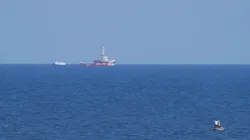Israel-Hamas war: First ship using new sea route delivers humanitarian aid to Gaza
The ship delivered 200 tonnes of humanitarian supplies, food and water to the war-torn Gaza as international pressure rises on Israel. Meanwhile, Israeli PM Benjamin Netanyahu approved a potential assault plan on the southern Gaza city of Rafah.

Gaza: A ship delivered 200 tonnes of humanitarian supplies, food and water to the beleaguered Gaza Strip on Friday by using a new sea route from Cyprus, announced the Israeli military as Prime Minister Benjamin Netanyahu approved plans for an invasion in the Rafah town bordering Egypt. Israel has been under increasing pressure to allow more aid into Gaza during the devastating war, with several people resorting to eating animal feed and weeds.
Floating on a barge attached by rope to a salvage ship, rough seas appeared to slow down the cargo reaching land, according to footage posted by the World Central Kitchen (WCK). Meanwhile, the US has joined other countries in airdropping supplies into northern Gaza and has announced separate plans to construct a pier to get aid in the Palestinian enclave.
The ship was operated by the Spanish aid group Open Arms and left the Cyprus coast on Tuesday with food items, including rice, flour, lentils, beans, tuna and canned meat provided by WCK. In the evening, the military said its cargo had been unloaded onto 12 trucks.
Many aid groups have argued that the airdrops and sea shipments are far less efficient than trucks in delivering the massive amounts of aid needed in the area. Instead, the groups have called on Israel to guarantee safe corridors for truck convoys after land deliveries became nearly impossible due to military restrictions, ongoing hostilities and the breakdown of order after the Hamas-run police force largely vanished from the streets.
The food is to be distributed in the north, the largely devastated target of Israel’s initial offensive in Gaza, where up to 300,000 Palestinians are believed to remain, mostly cut off by Israeli forces since October. The delivery is intended to pave the way for larger shipments. A second vessel will head to Gaza once the supplies on the first ship are distributed, Cyprus’ Foreign Minister Constantinos Kombos said.
Netanyahu approves plans for Rafah invasion
Amid the deteriorating situation, Israel approved a potential assault plan on the southern Gaza city of Rafah on Friday while also keeping ceasefire hopes alive by sending another delegation to Qatar for talks on a possible hostage deal with militant group Hamas. Netanyahu's office said he had green-lit a plan to attack the city where more than half of its 2.3 million residents are sheltering after five months of war.
Global allies and critics have urged Netanyahu to hold off attacking Rafah, fearing mass civilian casualties, but Israel says it is one of the last strongholds of Hamas whom it has pledged to eliminate and that residents will be evacuated. The White House said a Hamas ceasefire-for-hostages proposal was within the bounds of what was possible and expressed cautious optimism about it.
Hamas has presented a Gaza ceasefire proposal to mediators and the US, which includes the release of Israeli hostages in exchange for freedom for Palestinian prisoners, 100 of whom are serving life sentences. A statement from Netanyahu's office on the Rafah attack plan said Hamas' demands for the release of hostages remained unrealistic, but an Israeli delegation would still head to Doha once the security cabinet had discussed its position.
The Israeli statement said the Israeli Defence Forces (IDF) was "preparing operationally and for the evacuation of the population" of Rafah. It gave no time frame and there was no immediate evidence of extra preparations on the ground.
Senior Hamas official Sami Abu Zuhri accused Netanyahu of "manoeuvring ... to conduct more crimes of genocide". ""He isn't interested in reaching an agreement," he told Reuters. Israel has rejected claims of genocide, saying it is purely focused on destroying all Hamas fighters.
What is happening in Gaza?
The Israel-Hamas war was triggered by Hamas’ Oct. 7 attack on Israel that killed 1,200 people and resulted in another 250 being taken into Gaza as hostages. Israel’s offensive in Gaza has killed over 31,000 Palestinians and driven most of Gaza’s 2.3 million people from their homes. A quarter of Gaza’s population is starving, according to the United Nations.
Negotiators failed this week to reach a ceasefire agreement in time for the Ramadan Muslim holy month. Washington and Arab mediators are still determined to reach a deal to head off an assault on Rafah and let in food to stave off starvation.
The Palestinian Health Ministry in Gaza accused Israeli forces late Thursday of attacking Palestinians waiting for an aid convoy at a distribution point in northern Gaza, killing at least 20 people and wounding 155. At Shifa Hospital, doctors said the casualties were mostly hit by live fire, with some showing signs of being crushed. The Israeli military denied its forces fired at civilians or the convoy.
Plans for a sea route took shape after Israeli forces allegedly fired on a crowd of Palestinians near an aid convoy, killing 118. The United States and other countries joined Jordan in dropping aid into the north by plane, but people in northern Gaza say the airdrops are not enough to meet the vast needs of the devastated enclave.
Meanwhile, the Al-Aqsa Mosque in Jerusalem, the third-holiest site in Islam, saw the first Friday prayers of Ramadan without a major outbreak of protest or violence. The mosque has been a frequent flashpoint for Israeli-Palestinian violence in the past. Israel limited West Bank Palestinians’ access to Friday’s prayers to men over 55, women over 50 and children under 10.
(with inputs from agencies)
ALSO READ | Israel-Hamas war: US finalises draft UN resolution on 'immediate and sustained' ceasefire in Gaza